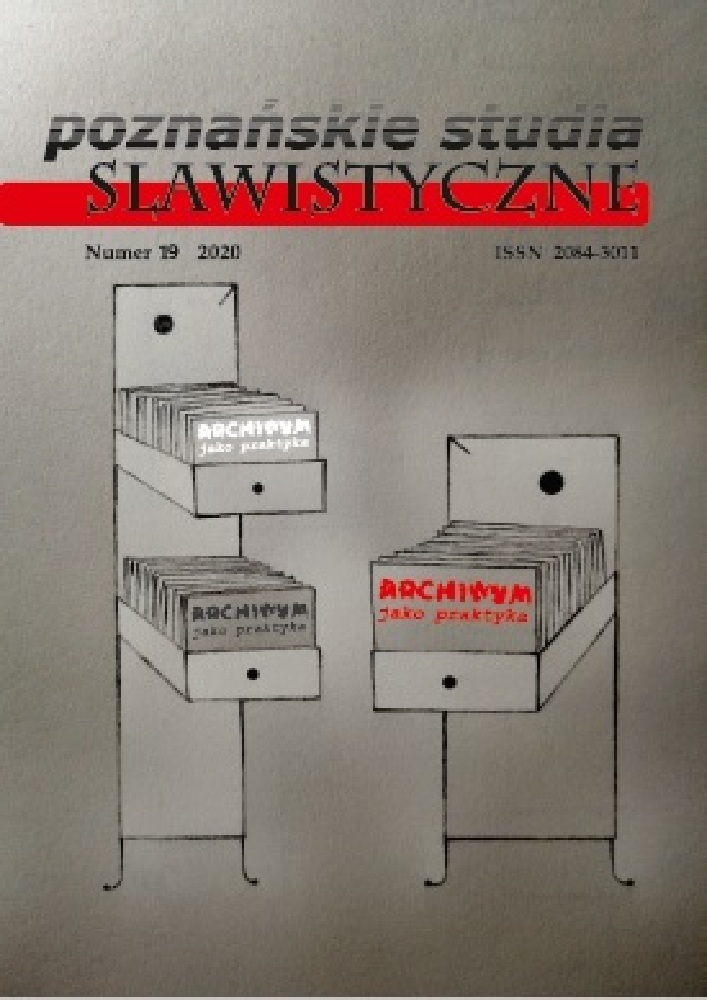Abstract
The paper focuses on the reception of Derrida’s Archive Fever among (new) media theorists and its relevance for the ongoing discussions in that academic field. Although this Derrida’s text is often described as the one in which he provides a statement on the pervasive revolutionary impact of new media, its reception among media theorists remains scarce. Several media scholars that tackle the text, however, have an ambivalent stance on it: they appreciate some of Derrida’s theses, but regard them largely obsolete. The first part of the paper analyzes these critiques and argues that many of the objections on Derrida’s behalf are caused by the misinterpretation of important features of the deconstructive thought. In its second part, the paper firstly deals with certain weaker points of Derrida’s reflection and then proceeds to examine his insights pertinent to the problems of contemporary media theory that were neglected in earlier reception. Finally, paper reaffirms the claim about the need for a more profound exchange between the deconstruction and media studies, albeit one that would avoid the examined shortcomings.
References
Aarseth, E. J. (1997). Cybertext. Perspectives on Ergodic Literature. Baltimore–London: The John Hopkins University Press.
Choat, S. (2010). Marx Through Post-Structuralism. Lyotard, Derrida, Foucault, Deleuze. London–New York: Continuum. https://doi.org/10.1080/23269995.2011.10707898.
Deleuze, G. (1992). Postscript on the Societies of Control. “October” 59, pp. 3–7.
Deleuze, G., Guattari, F. (1987). A Thousand Plateaus [1980]. Trans. B. Massumi. Minneapolis–London: The University of Minnesota Press.
Derrida, J. (1981). Positions [1972]. Trans. A. Bass. Chicago: The University of Chicago Press.
Derrida, J. (1988). Limited Inc. Trans. S. Weber, J. Mehlman. Evanston: Northwestern University Press.
Derrida, J. (1994). Specters of Marx. The State of the Debt, the Work of Mourning and the New International [1993]. Trans. P. Kamuf. London–New York: Routledge.
Derrida, J. (1995). Points [1992]. Trans. P. Kamuf et al. Stanford: Stanford University Press.
Derrida, J. (1996). Archive Fever. A Freudian Impression [1995]. Trans. Eric Prenowitz. Chicago–London: The University of Chicago Press. https://doi.org/10.2307/465144.
Derrida, J. (1997). Of Grammatology [1967]. Trans. G. Chakravorty Spivak. Baltimore–London: The John Hopkins University Press.
Derrida, J. (2001). Writing and Difference [1967]. Trans. A. Bass. London–New York: Routledge.
Derrida, J., Stiegler, B. (2002). Ecographies of Television. Filmed Interviews. Trans. J. Bajorek. Cambridge: Polity Press.
Galloway, A. R. (2004). Protocol. How Control Exists after Decentralization. Cambridge–London: MIT Press. https://doi.org/10.7551/mitpress/5658.001.0001.
Gane, N., Beer, D. (2008). New Media. Key Concepts. Oxford–New York: Berg.
Hjorth, L. (2011). Games and Gaming. An Introduction to New Media. Oxford–New York: Berg.
Lévy, P. (2001). Cyberculture (1997). Trans. R. Bononno. Minneapolis: Minnesota Press.
Mannovich, L. (2002). The Language of New Media. Cambridge: MIT Press.
McLuhan, M. (1994). Understanding Media. The Extensions of Man [1964]. Cambridge–London: MIT Press.
Peović Vuković, K. (2012). Mediji i kultura. Ideologija medija nakon decentralizacije. Zagreb: Jesenski i Turk.
Poster, M. (1996). CyberDemocracy: Internet and the Public Sphere. In: Internet Culture. Ed. D. Porter. London–New York: Routledge, pp. 201–219.
Strathausen, C. (2009). The Philosopher’s Body: Derrida and Teletechnology. “The New Centennial Review” 9/2, pp. 139–164.
Wells, K. H. (2008). Ancestral Irrepressible: Marshall McLuhan and the Future of the Archive in Derrida’s Archive Fever. “Flusser Studies” 6. http://www.flusserstudies.net/archive/flusser-studies-06-may-2008. 6.10.2020.
Wolfe, C. (2008). Ecographies from my life in the bush of ghosts. “Angelaiki” 13/1, pp. 85–94.
License
Copyright (c) 2020 Zvonimir Glavaš

This work is licensed under a Creative Commons Attribution-NoDerivatives 4.0 International License.

